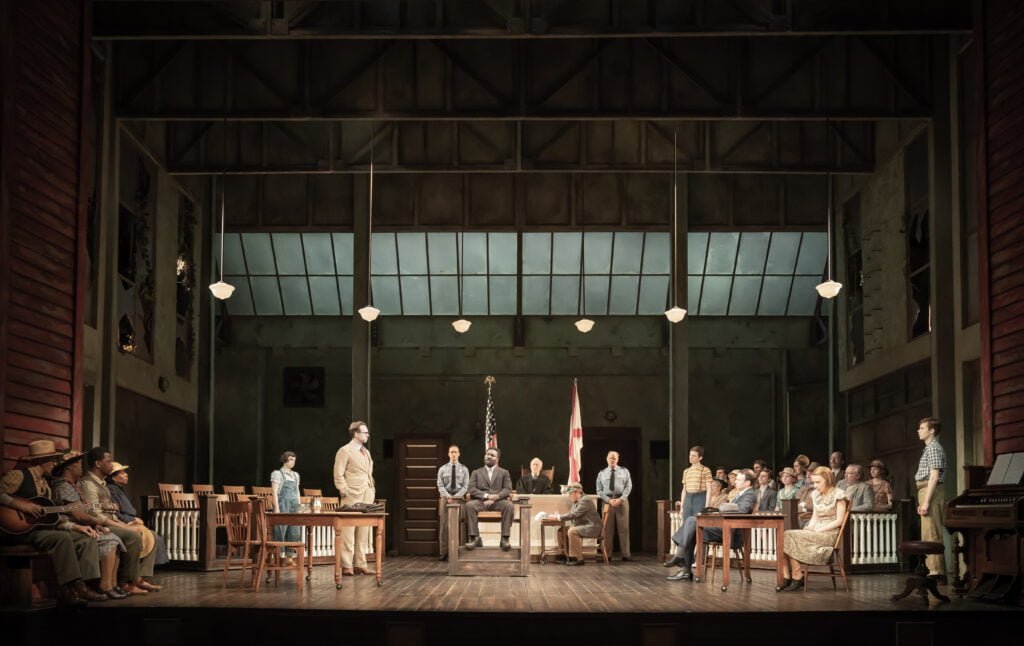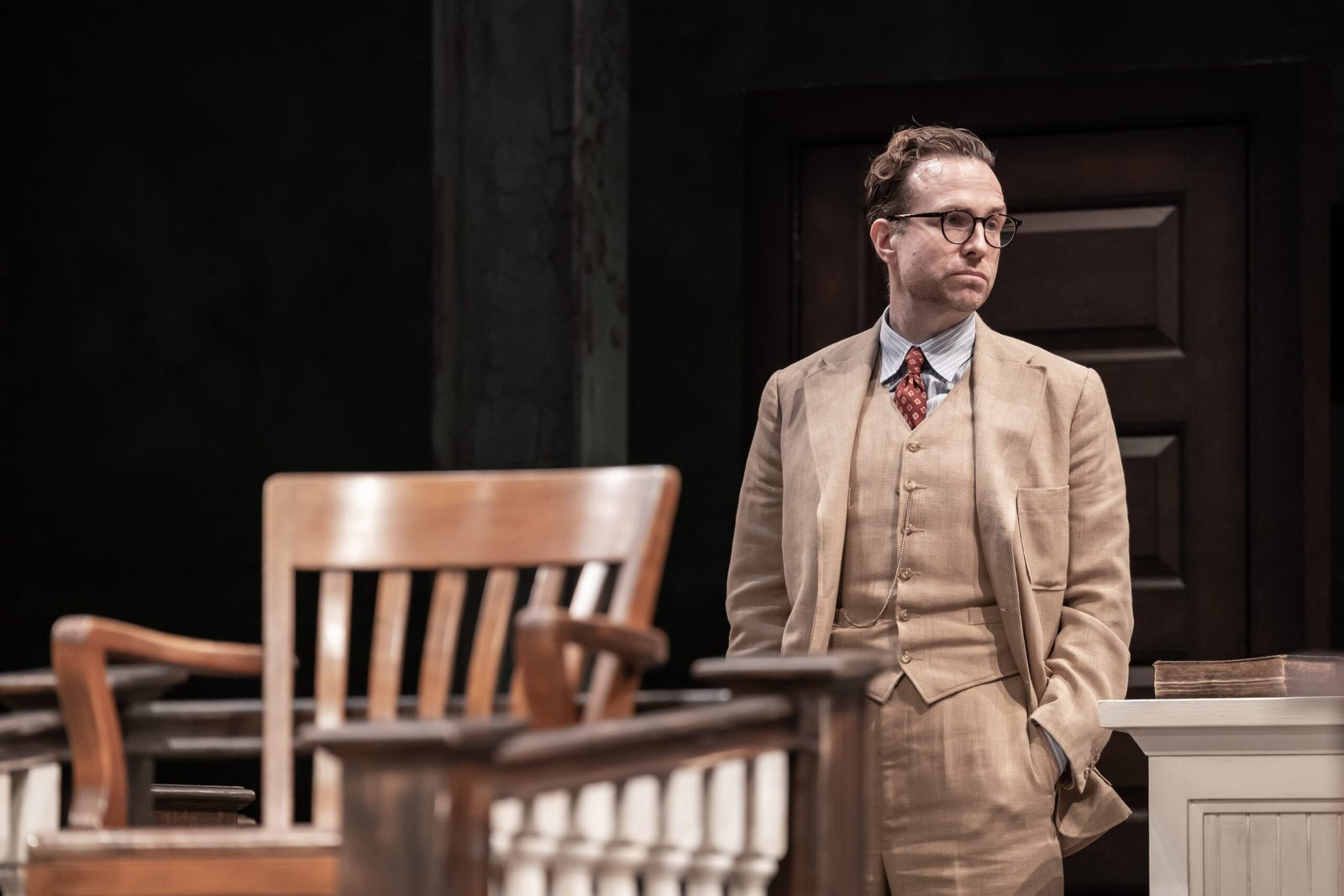To Kill a Mocking Bird to die for!
“A conscience can be exhausting. It can keep you up at night.”
Atticus Finch

London has waited too long for Bartlett Sher and Aaron Sorkin’s To Kill a Mockingbird since it launched on Broadway in 2019 but like great works, it is worth waiting for. Aaron Sorkin’s new version rewrites Scout Finch (Gwyneth Keyworth)’s sole narration and becomes more of a thrilling court room drama as scenes from the court are interspersed throughout, rather than as a final scene. Sorkin’s work on The West Wing is well known. The children are acted by adults which works exceptionally well and we relish their humour.
Atticus Finch (Rafe Spall) is probably more conflicted than Gregory Peck’s impossibly handsome and noble, 1960s film version of the Southern lawyer who shies away from criminal cases. This is after he lost a case and two black men died. Atticus wears the familiar pale linen suit and waistcoat, red tie, brown brogues and heavy horn rimmed spectacles.
It is Calpurnia (Pamela Nomvete) who, in the final scenes, teaches Atticus about the realities of life as a black person in Alabama in 1930. Atticus is not without bravery as he takes a standard reading lamp and a book and sets himself up outside the Court House at night where Tom Robinson (Jude Owusu) is imprisoned to await the inevitable KKK lynching mob.

The publication of Harper Lee’s prequel Go Set a Watchman in 2015, probably against her wishes as she was mentally frail, has permanently tainted Atticus Finch’s character. Sorkin’s play tackles Atticus’s defence of his neighbours with his view of essential goodness in people. From our perspective in 2022, we cannot forgive the prejudiced white jury’s finding against all the evidence.
With the killing of George Floyd in 2020 and the popular support for Donald Trump, we may not be as far as we had hoped from intransigence and racial suspicion, shown here in 1930s Alabama.

Bartlett Sher gets tip top and believable, involving performances from his cast. Patrick O’Kane is brutal and frightening as Bob Ewell, a Southerner still carrying the damage of the Civil War defeat and, as his daughter Myella, Poppy Lee Friar is a fragile, beaten child deprived of love. I liked Jim Norton’s intervening and caring judge but who didn’t seem to direct the jury on their verdict.
I feel confident in predicting theatrical knight status for Rafe Spall after seeing his magnificent portrayal of Atticus Finch. He has a vulnerable humanity we may aspire to. But the ensemble performances here are all strong.
Gwyneth Keyworth’s Scout, a girl tomboy in dungarees is natural and impulsive contrasting with her elder brother Jem (Harry Redding) who shares the narration but who doesn’t believe there is good in everyone. Scout will demonstrate the meaning of “exculpatory evidence” with a twinkle. The Finch children and Dill pop up in the courtroom scenes but it seems quite natural. Jem is made to apologise for destroying racist Mrs Dubose (Amanda Boxer)’s flowering camelia. As their friend Dill Harris, the character based on Harper Lee’s friend Truman Capote, David Moorst has words that hint at his probably developing as a gay man. Dill’s quirkiness is often light relief.

Miriam Buether’s sets change from court room to the front porch of the Finchs’ home. The first court room set is constructed slowly and is filled with the cast gradually, raising tension. The scenes are most lit low so we don’t feel the sweaty heat of the South but instead an enclosed, stifling community. The costumes are all in period.
Sorkin has cut some of the minor characters but this means we can concentrate on others. Tom Robinson (Jude Owusu) voices his own situation in depth. Atticus gets to speak Miss Maudie’s words in the novel about the innocence of the mockingbird, giving the play its unusual title. It is no accident that the hero is also a songbird by name.
Bartlett Sher’s production is as perfect as you could wish for, making this a five star creation of Harper Lee’s beautiful novel. Unmissable!

Production Notes
To Kill a Mockingbird
Written by Aaron Sorkin
Based on Harper Lee’s novel
Directed by Bartlett Sher
Cast
Starring:
Rafe Spall
David Sturzaker
Gwyneth Keyworth
Harry Redding
David Moorst
Jude Owusu
Patrick O’Kane
Poppy Lee Friar
Pamela Nomvete
Jim Norton
Amanda Boxer
With:
John Hastings
Tom Mannion
Simon Hepworth
Harry Attwell
Laura Howard
Natasha Williams
Lloyd Hutchinson
Creatives
Director: Bartlett Sher
Set Designer: Miriam Buether
Costume Designer: Ann Roth
Original Music: Adam Guettel
Musical Director: Candida Caldicot
Lighting Designer: Jennifer Tipton
Costume Designer: Jon Morrell
Sound Designer: Scott Lehrer
Fight Director: RC Annie
Information
Running Time: Two hours 50 minutes with an interval
Booking until 19th November 2022
Theatre:
Gielgud Theatre
Shaftesbury Avenue
London W1D 6AR
Tube : Piccadilly Circus
Telephone: 0844 482 5151 (7p per minute +)
Website: https://www.tokillamockingbird.co.uk
Reviewed by Lizzie Loveridge
at the Gielgud Theatre
on 31st March 2022

